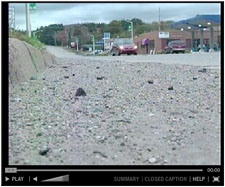You are currently browsing the monthly archive for October 2010.
Building off of Lansing’s recently adopted Complete Streets ordinance, the City adopted a snow and ice removal ordinance earlier this week. The ordinance is a natural extension of the City’s Complete Streets policy as it insures that the sidewalks will be accessible to all users even in the winter months. If residents do not clear their sidewalk within 24 hours of a snowstorm, they could receive a notice from the city of its plan to clear it for them at a minimum cost of $116 added to their property tax bill. The City has struggled with this issue in recent years, especially in regards to vacant property owners who do not properly maintain their walks. Mid-Michigan Environmental Action Council, a Michigan Complete Streets Coalition partner, was the driving force behind the ordinance.
 Not only did the Michigan Legislature find the $84 million it needed for Fiscal Year 2011 to make sure Michigan doesn’t leave $475 million in federal road money on the table, but the state’s transportation budget, as adopted earlier this week, also includes language that gives funding preference to communities that have Complete Streets policies. Section 321 reads:
Not only did the Michigan Legislature find the $84 million it needed for Fiscal Year 2011 to make sure Michigan doesn’t leave $475 million in federal road money on the table, but the state’s transportation budget, as adopted earlier this week, also includes language that gives funding preference to communities that have Complete Streets policies. Section 321 reads:
In evaluating and awarding enhancement grants, the department shall give preference to applicants which have adopted complete streets policies. In addition, the department shall give preference to enhancement grant applications which further complete streets policy objectives. The department shall report to the house and senate appropriations subcommittees on transportation, and the house and senate fiscal agencies, on or before March 1, 2011, on the specific actions taken to comply with the intent of this section.
The budget also includes language that could help Michigan universities implement Complete Streets on campus roads which are considered private. Section 322 states:
Upon request of a university, the department shall work with representatives of state public universities to assist in the development and implementation of complete streets policies on university road and street systems.
The Coalition is extremely pleased to see this language included in the budget. Giving funding preference to communities with Complete Streets policies is an excellent opportunity to encourage more local policies since the recent statewide law only effects the 8% of roads controlled by MDOT.
 The Marquette County Health Department held a forum this week to educate people on Complete Streets in hopes of passing an ordinance in the near future.
The Marquette County Health Department held a forum this week to educate people on Complete Streets in hopes of passing an ordinance in the near future.
“We want everyone to walk today with a knowledge of what complete streets is, what the benefits of it are, how to implement it locally,” Holly Madill Complete Streets Project Coordinator of the Michigan Department of Community Health said.















